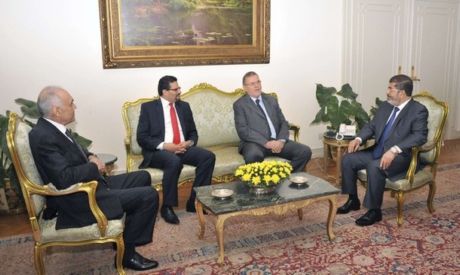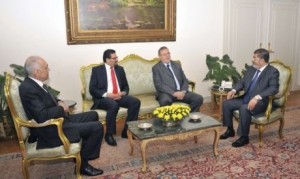By Hadi Fornaji.
Tripoli, 31 July 2012:
Libya, Tunisia and Egypt . . .[restrict]have taken a further step towards closer economic cooperation, issuing “The Cairo Declaration” which includes the plan that entry visas will be abolished for their citizens.
Egyptian President Mohammed Morsi hosted Libyan foreign minister Ashour Ben Khayal and his Tunisian counterpart Rafik Abdessalem at a summit in the Egyptian capital, which looked largely at deepening economic ties.
After the talks, Morsi said that he believed that entry visas could be abolished soon, depending on the security situation in all three countries.
However, observers in Libya suggested that, as with closer economic cooperation, this is currently very much an expression of hope, rather than immediate intent. There are an estimated 750,000 Egyptians anxious to find work in Libya, largely as labourers. The country could not yet cope with such a flood of economic immigrants, without the controlling mechanism of a visa regime.
In the view of a diplomat close to the Cairo talks, it was accepted that nothing is going to happen overnight and that the requirement for visas will be phased out gradually.
The visa issue is however, probably of less importance than that four months after their first meeting in Tunis to discus closer cooperation, the three countries have met again.
After those first discussions the three foreign ministers, Khayal, Abdessalem and Egypt’s Mohamed Amr announced a new coordinating body to work on closer tripartite relations. They were at pains though to emphasise that there was no intention to replace or rival the Maghreb Union, which also includes Algeria, Mauritania and Morocco.
The agenda has not been confined to economic links. In both Tunis and now Cairo, attention has been given to boosting collaboration on security, especially on borders, in order to combat terrorism, drug smuggling and illegal migration.
In March, an Egyptian negotiator pointed out that cross-border communities, some of which have long been involved in smuggling, could benefit from coordinated economic development on both sides of the frontier, which could generate incentives to act against smugglers.
trio stressed the importance of reinforcing cooperation in security, especially on the borders, in fighting terrorism, drug smuggling and illegal migration. The economy at the borders will be developed to address some of these security and migration issues. [/restrict]











